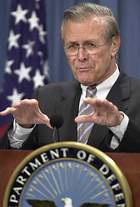Washington shifts attention to southern 'threats'
The US government increases involvement in Latin American issues as warn on 'the populist threat'

The “populist threat” in Latin America is an issue that has started climbing up positions in the US foreign agenda since the last moves in President's Bush cabinet pushed forward prominent hardliners to the top of the administration. The unseen interest of George W. Bush's first mandate turned recently into a more active participation of US high officials in regional issues.
Last week, the US media attention was focused more in Pentagon chief Donald Rumsfeld's efforts to block the sale of Russian weapons to Venezuela than in the North American Summit in Texas. In his swing through Argentina, Brazil and Guatemala, Rumsfeld made clear efforts to sound the alarm against possible threats coming from Latin America targeting Venezuela's leftist President Hugo Chavez as the main troublemaker.
But the southern headaches of Washington do not come only from Venezuela and its independent foreign policy based in oil incomes. The unstable situation in Bolivia and the prospects of a new shift to left in Nicaragua are ranking high in Rumsfeld-Rice's increasing spending in aspirins.
At the start of Rumsfeld's trip, Washington announced the suspension of all US military assistance to Nicaragua - about 2.3 million dollars' worth - pending the destruction of the missiles that Washington contend might be obtained by terrorists. According to the Pentagon, Nicaragua is hoarding hundreds of Russian-made surface-to-air-missiles and Washington wants them destroyed.
Reports from Washington tell that US diplomats are becoming highly involved in Latin American issues. They are also reassuming their contacts with correspondents from Latin mass media outlets and groups of interest in the region.
According to the US media, President George W. Bush himself “is taking a personal interest in Chavez' actions and rhetoric and that various policy options to toughen Washington's stance toward Caracas, including efforts to discredit the Venezuelan leader for alleged corruption, and to persuade his neighbours, notably Brazil, to distance themselves from him, were now being actively pursued.” On Tuesday, as Chavez was holding a summit with his Colombian, Spanish and Brazilian counterparts, Bush made a surprising phone call to Argentina's Nestor Kirchner, stating his concerns over the situation in Venezuela and Bolivia.
Bush thanked Argentina for aiding to stabilize the situation in Haiti and Bolivia and asked Kirchner “to do the same in Venezuela,” which means that Buenos Aires is not acting accordingly. It is, indeed, a diplomatic way to ask for cooperation to its strategy aimed to “contain” Chavez.
Accordingly, Rumsfeld chose Brazil to slam Venezuela's acquisition of 100,000 AK-47 Russian assault rifles. “I can't imagine why Venezuela needs 100,000 AK-47s, I can't imagine what is going to happen to 100,000 AK-47s," Rumsfeld said just before his meeting with Brazilian President Luiz Inacio Lula da Silva. If the shipment goes through, Rumsfeld added, "it wouldn't be good for the hemisphere."
More and more comments about the “populist threat” coming from Latin America are being reported, which means that Washington is solely interested in Middle East no more.
On the Photo: US Secretary of Defense, Donald Rumsfeld.
Subscribe to Pravda.Ru Telegram channel, Facebook, RSS!


